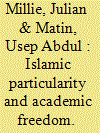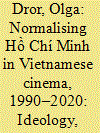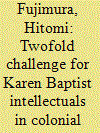|
|
|
Sort Order |
|
|
|
Items / Page
|
|
|
|
|
|
|
| Srl | Item |
| 1 |
ID:
188735


|
|
|
|
|
| Summary/Abstract |
Visitors to the city of Bangkok are often struck by the sight of exposed, dangling, and dangerous electrical wires and a multitude of inconveniently placed utility posts that impede pedestrian circulation. This article argues that the city's seemingly dysfunctional electric power infrastructure is not a failure of modernisation but the outcome, or ‘style’, of a socio-technological system built by and operated for a narrow set of interests. To demonstrate this, the article presents a history of the electric power system that shows how its initial development in the early twentieth century produced new forms of privilege and disenfranchisement that are now the basis of social division in the city. By approaching the study of Bangkok's electric power system in terms of equity, the article offers a framework for evaluating how infrastructure shapes cultural practice, social relations, and political authority.
|
|
|
|
|
|
|
|
|
|
|
|
|
|
|
|
| 2 |
ID:
188742


|
|
|
|
|
| Summary/Abstract |
This article offers a new perspective on the reception of Marxism in Indonesia by examining the first Malay translations of The Communist Manifesto, published in 1923 and 1925. These translations, made from Dutch and German source texts, ‘domesticated’ the Manifesto by exchanging certain European terms for vernacular ones with greater resonance in the Indonesian context. They also introduced a wider Indonesian audience to Marxist class concepts, which offered a new international way of conceptualising political resistance, and terms from European philosophy and history. In the process, they broke down the barriers built up by Dutch colonial authorities to keep radical European political texts away from vernacular languages. After the failed communist uprisings of 1926–27, the increasingly intense colonial policing regime stifled further dissemination of the Manifesto, but translations of Marx and Engels’ text received a new lease of life during the Indonesian Revolution (1945–49) and in the postwar decades. The Communist Manifesto was suppressed once more under the anti-communist New Order regime which came to power in 1966 and reconstructed the barrier between radical European political thought and the Indonesian language that had been erected by the Dutch.
|
|
|
|
|
|
|
|
|
|
|
|
|
|
|
|
| 3 |
ID:
188737


|
|
|
|
|
| Summary/Abstract |
The Indonesian Muslim community includes segments dedicated to contrasting pious projects and doctrinal positions, yet the nation's Ministry of Religion (MORA) manages aspects of Islamic life while purporting to more or less transcend such contrasts. This tension recently emerged in Indonesian public life when a state Islamic university defended the autonomy of its research practices against a challenge by scholars from outside the university who claimed that the doctoral project of Jalaluddin Rakhmat (1949–2021) offended doctrinal positions of the Sunni majority and gave priority to Shiite historiography and doctrine. This dispute shows how questions concerning academic method become disputes about public interest, and further, its resolution attests to the emergence of free inquiry as an Islamic value in the environment of MORA's universities. Academics cited the example of earlier generations of scholars as supporting precedent for an Islamic principle of free inquiry.
|
|
|
|
|
|
|
|
|
|
|
|
|
|
|
|
| 4 |
ID:
188741


|
|
|
|
|
| Summary/Abstract |
The article discusses the representation of Hồ Chí Minh in modern Vietnamese cinema from 1990 to the present. The first feature film on Hồ Chí Minh's life was produced only in 1990, 31 years after his death. Since then, 6 more films have appeared. I explore the reasons why there were no feature films about Hồ Chí Minh before 1990 and why they eventually began to appear. I address the filmmakers’ attempts to reintroduce Hồ Chí Minh, especially to younger generations who know of him only through propaganda depicting him as a celibate paragon of virtue and through viewing his embalmed body in the Mausoleum he had objected to. I argue that these cinematographic projects to promote Hồ Chí Minh to younger Vietnamese have done very little to develop, or even maintain, his personal cult, a cult that the state endeavours to exploit to (re)establish its connection to the people, to overcome a prolonged crisis of legitimacy, and to garner popular support for the continuing leadership of the Vietnamese Communist Party. The market economy and openness to the world have inevitably undermined the Hồ Chí Minh cult and ideological constructs supporting it.
|
|
|
|
|
|
|
|
|
|
|
|
|
|
|
|
| 5 |
ID:
188740


|
|
|
|
|
| Summary/Abstract |
This article considers heritage-making associated with Moluccans who, in 1951, were forced out of political necessity to migrate from what is present-day Indonesia to the Netherlands. Specifically, it examines how this story of movement has been represented at Barak 1B, a museum that marks the presence of the minority group within the Dutch nation. Following a brief history of the community, the article considers the genesis of the museum before outlining myriad strategies adopted within it to raise awareness about the Moluccan migrants, and insert them into the fold of national heritage-making in the Netherlands. It then considers public opinions about the museum to demonstrate how, despite appreciation for the gesture, the museum has also received criticisms revealing old wounds that have not healed, and contrasting ideas about how the community's heritage should be represented. Additionally, the article exposes the ambivalence felt by the community in terms of maintaining its ethnic identity and yet also ‘fitting in’ as Dutch, exposing tensions between the Moluccans and their hosts, as well as among the Moluccans themselves. It ends with implications for how heritage in Southeast Asia—both the region and its diasporas—need to be studied.
|
|
|
|
|
|
|
|
|
|
|
|
|
|
|
|
| 6 |
ID:
188738


|
|
|
|
|
| Summary/Abstract |
This article argues that in the last few years the Vietnamese state and the Vietnamese Communist Party have upgraded the commemoration of a Sino-Vietnamese War (1979–89) that had fallen into oblivion after the normalisation of Sino-Vietnamese relations in 1991. The first part of the article analyses the way in which Vietnam officially commemorated the 40th anniversary of the outbreak of the war against China in 2019. Vietnamese authorities such as the Department of Propaganda and Edcuation stepped up the commemoration of the war, but in comparison with that of the war against the Pol Pot regime it was much more subdued and low-key. The second part of the article shows that the veterans of the Vị Xuyên battle in Hà Giang province where fierce battles had taken place between 1984 and 1989 have actively shaped the commemoration of the war by organising commemorative activities on the old battlefield and reaching out to state media and social media. This highlights the significance of ‘agents of remembrance’ in Vietnam who, along with the official Vietnamese ‘memory machine’, also make important contributions to the commemoration of the past.
|
|
|
|
|
|
|
|
|
|
|
|
|
|
|
|
| 7 |
ID:
188736


|
|
|
|
|
| Summary/Abstract |
This study focuses on state–state relations for business, a phenomenon shaped by how local power elites (LPEs), in this case, in Malaysia, collaborate with transnational corporate elites (TCEs), in this case, from China, to implement infrastructure projects linked to the latter's Belt and Road Initiative (BRI). These LPE-TCE links, which have led to the creation of novel forms of state–business relations (SBRs), offer interesting theoretical insights for SBR-related studies. This article builds on the conventional wisdom of homogenised SBRs as usually driven by bureaucrats by indicating that, in practice, state–business ties are extremely heterogeneous, with the capture of key institutions by influential LPEs. A conceptual framework explains theoretically how state–state relations, forged by two countries, both led by dominant parties that control their respective enterprises, have contributed to unique SBRs created to undertake BRI projects, driven by LPE-TCE links. Case studies of three BRI projects in Malaysia provide insights into how disparate forms of SBR-based institutional architecture function, not only at the federal level, but also in different states, involving enterprises from China. Diverse types of power relationships have emerged in these joint ventures, encompassing different LPEs, contributing to the creation of dissimilar SBRs. These LPEs have turned effective SBRs, fashioned to implement BRI projects, into economic endeavours that feature rent-seeking behaviour.
|
|
|
|
|
|
|
|
|
|
|
|
|
|
|
|
| 8 |
ID:
188739


|
|
|
|
|
| Summary/Abstract |
Two years after the Anglo-Burmese War, with the British colonial takeover of Burma complete and yet still subject to outbreaks of rebellions, a small group of Karen Baptist intellectuals in Rangoon who formed the Karen National Association (KNA), attempted to assert a political claim to Karen nationhood. This article focuses on two letters, in English and Sgaw Karen, presented by Karen delegates on the occasion of the ceremony to celebrate the Golden Jubilee of Queen Victoria in 1887 in Rangoon, to investigate the colonial politics of loyalty and national claim. It argues that the letters were written for two different audiences, and by doing so the Karen Baptists were asserting dual claims; one directed at the British colonial authorities and the other, the wider population of Karen in Burma, with their multiple Karennic languages and religious and other affiliations. Both appeals failed to get the desired responses, however. This article then discusses the contradiction that this assertion of Karen nationhood alienated the Baptist leaders from their own diverse community.
|
|
|
|
|
|
|
|
|
|
|
|
|
|
|
|
|
|
|
|
|